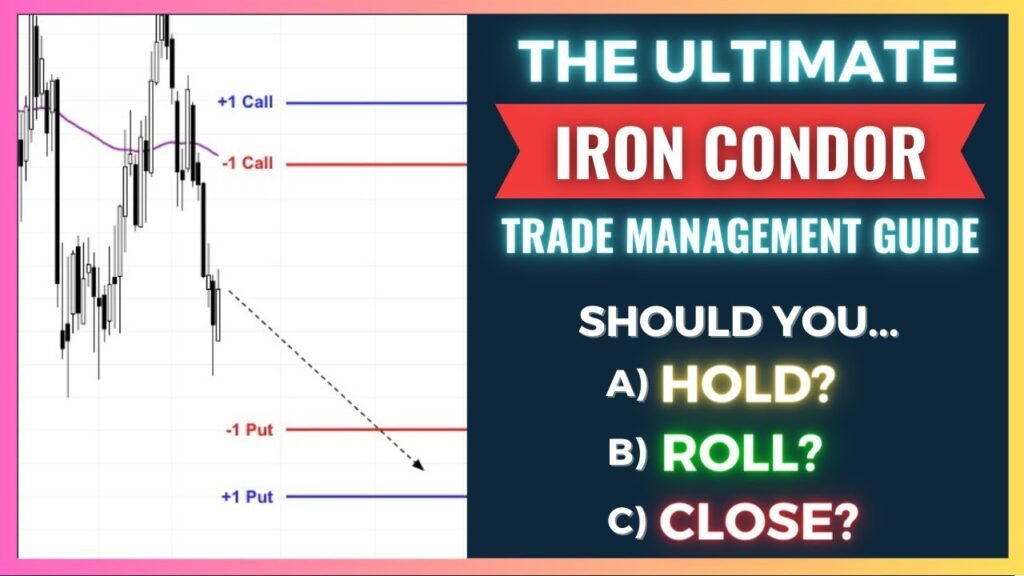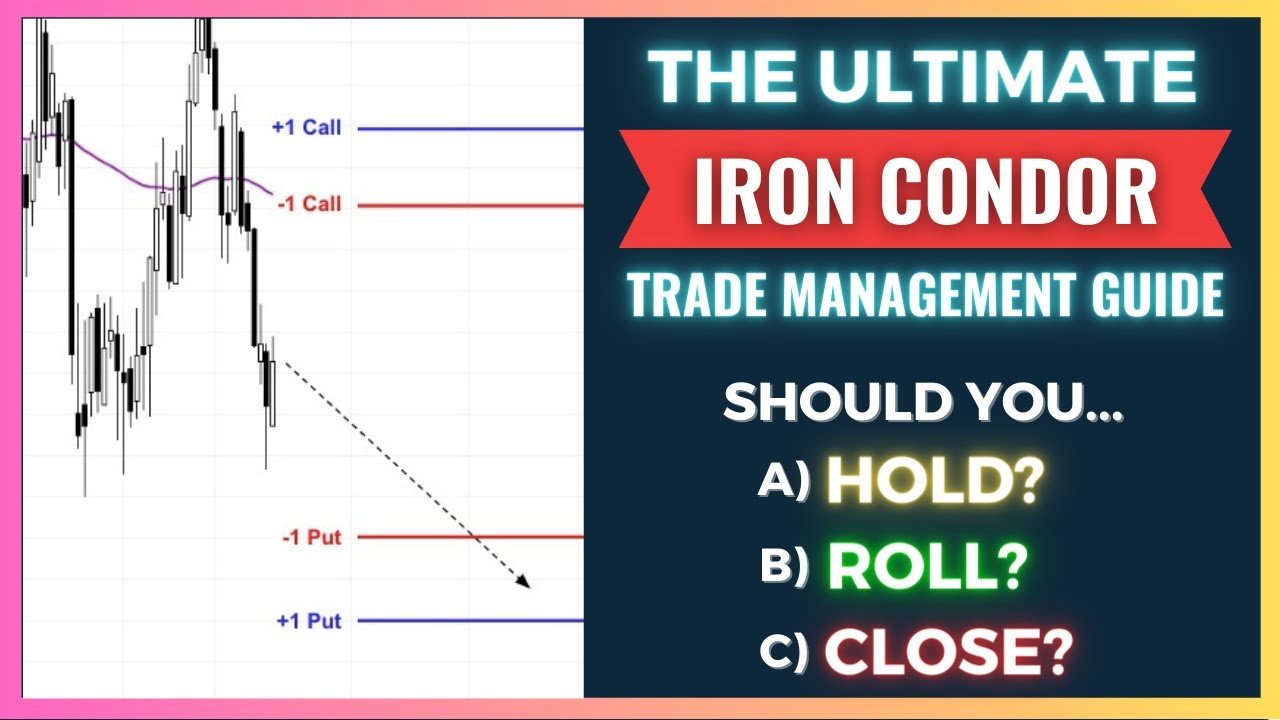In the video titled “To Be Profitable Trading Iron Condors, You NEED To Know This!” by Options with Davis, the strategies of holding, rolling, or closing an Iron Condor trade are thoroughly discussed. The video presents 7 likely scenarios that traders may face when trading Iron Condors and offers specific guidance on whether to hold, roll, or close the trade for each scenario. Viewers may also find other related videos on the channel interesting, and the Options Income Blueprint is mentioned, which can be obtained for free. The content covers generating income with credit spreads and iron condors, consistent income with the iron condor strategy, recurring profits with the Wheel strategy, as well as the calculation of risk in credit spreads and the management of trades in various market conditions. Additionally, it emphasizes the importance of exiting at 21 DTE for better long-term performance and highlights potential risks and considerations in rolling trades.

Strategies for Iron Condor Trades
Iron Condor trades can be a profitable strategy when managed effectively. There are three main strategies that traders can employ when trading Iron Condors: Holding, Rolling, and Closing.
Holding
Holding an Iron Condor trade means keeping the trade open until expiration. This strategy is typically employed when the market remains within the expected range and the trade is still profitable. By holding the trade, traders can allow the options to expire worthless and pocket the premium received.
Rolling
Rolling an Iron Condor trade involves closing the existing position and opening a new one with different strike prices or expiration dates. This strategy is useful when the market breaks out of the expected range or moves towards the short or outer strikes. By rolling the trade, traders can adjust their position to take advantage of new market conditions and potentially mitigate losses.
Closing
Closing an Iron Condor trade means exiting the position before expiration. This strategy is often used when the market moves against the short strike or the trade reaches a predetermined profit target. By closing the trade, traders can lock in profits or limit losses.
Scenarios in Iron Condor Trading
When trading Iron Condors, traders may encounter various scenarios depending on market conditions. It’s important to have a plan for each scenario to know whether to hold, roll, or close the trade.
Scenario 1: Market remains within expected range
In this scenario, the market stays within the expected range of the Iron Condor’s short legs. The trade is still profitable, and there is time left until expiration. Traders can choose to hold the trade, as there is no need for any adjustments or exits at this point.
Scenario 2: Market breaks out of expected range
If the market breaks out of the expected range and starts moving towards the short or outer strikes, it may be necessary to take action. Traders should consider closing the Iron Condor and opening a new one with wider strike prices to accommodate the new market conditions.
Scenario 3: Market moves towards short strike
In this scenario, the market starts moving towards the short strike of the Iron Condor. Traders may choose to roll downwards by closing the existing position and opening a new one with lower strike prices to adjust to the market movement.
Scenario 4: Market moves towards outer strike
If the market starts moving towards the outer strike of the Iron Condor, traders may opt to roll outwards. This involves closing the current position and opening a new one with wider strike prices to accommodate the market’s movement.
Scenario 5: Market moves against short strike
When the market moves against the short strike of the Iron Condor, traders may need to consider making roll adjustments. This can involve closing the current position and opening a new one with different strike prices to limit potential losses.
Scenario 6: Market moves against outer strike
If the market moves against the outer strike of the Iron Condor, traders may also need to make roll adjustments. This can be done by closing the current position and opening a new one with wider strike prices to adjust to the market’s movement.
Scenario 7: Market experiences extreme volatility
In the case of extreme market volatility, it may be necessary to reassess the Iron Condor trade. Traders may choose to close the position and wait for more stable market conditions before reentering the trade.
Guidance for Each Scenario
Here is a summary of the recommended actions for each scenario:
Scenario 1: Hold
If the market remains within the expected range and the trade is still profitable, it is generally advisable to hold the Iron Condor trade until expiration.
Scenario 2: Close and Open New Iron Condor
When the market breaks out of the expected range, it is recommended to close the existing Iron Condor trade and open a new one with wider strike prices to accommodate the new market conditions.
Scenario 3: Roll Downwards
If the market moves towards the short strike, it may be necessary to roll downwards by closing the current position and opening a new one with lower strike prices.
Scenario 4: Roll Outwards
When the market moves towards the outer strike, rolling outwards can be a suitable strategy. Traders can close the current position and open a new one with wider strike prices to adjust to the market movement.
Scenario 5: Roll Adjustments
If the market moves against the short strike, making roll adjustments can help limit potential losses. Traders can close the current position and open a new one with different strike prices.
Scenario 6: Roll Adjustments
Similar to Scenario 5, if the market moves against the outer strike, making roll adjustments can be necessary. Traders can close the current position and open a new one with wider strike prices to adjust to the market’s movement.
Scenario 7: Close and Reassess
In the case of extreme market volatility, it may be prudent to close the Iron Condor trade and reassess the market conditions before considering new trades.
By following these guidelines for each scenario, traders can effectively manage their Iron Condor trades and make informed decisions based on market conditions.
Other Interesting Videos on the Channel
Aside from the “To Be Profitable Trading Iron Condors, You NEED To Know This!” video, Options with Davis offers other informative videos on various trading strategies. Some of the other videos on the channel that viewers may find interesting include:
- Generating Income with Credit Spreads and Iron Condors
- Consistent Income with the Iron Condor Strategy
- Recurring Profits with the Wheel Strategy
These videos provide additional insights and strategies for traders looking to expand their options trading knowledge.
Options Income Blueprint
Options with Davis also mentions the Options Income Blueprint, a resource that traders can obtain for free. The Options Income Blueprint provides valuable information and guidance for generating income through options trading. By accessing this blueprint, traders can enhance their understanding of options trading strategies and maximize their potential for profitability.
Managing Trades: Scenarios and Options
In addition to the specific scenarios mentioned earlier, Options with Davis discusses various aspects of managing trades. This includes identifying market conditions, determining profit levels, and understanding the importance of exiting trades at 21 DTE (Days to Expiration). Traders are encouraged to consider the risks of holding trades past 21 DTE and the potential impact of rolling trades on the probability of profit. The video also highlights the risks of early assignment and margin calls.
These discussions provide traders with valuable insights into trade management and the factors to consider when making decisions about exiting or adjusting positions.
Conclusion
Trading Iron Condors can be a profitable strategy when approached with the right knowledge and understanding. By employing effective strategies for holding, rolling, and closing trades, traders can navigate various scenarios and make informed decisions. It is important to consider market conditions, profit levels, and the impact of adjustments on the probability of profit. By following the guidance provided in each scenario, traders can increase their chances of success and achieve consistent profits in their options trading journey.
